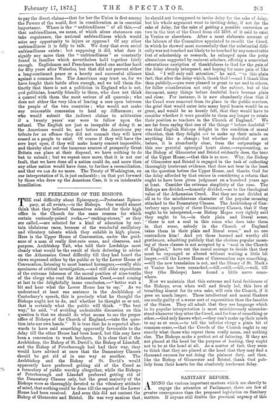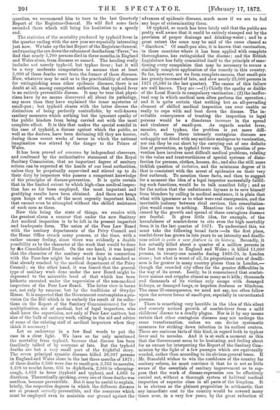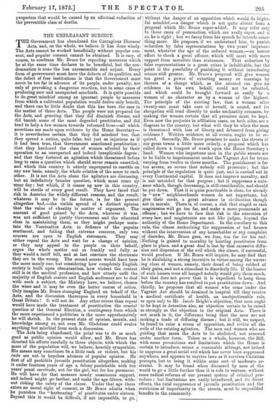SANITARY REFORM.
AMONG the various important matters which are shortly to engage the attention of Parliament, there are few of greater consequence than the proposed legislation on Sanitary matters. If anyone still doubts the practical urgency of this question, we recommend him to turn to the last Quarterly Report of the Registrar-General. He will find some facts recorded there which will bring his hesitation to a speedy end.
The statistics of the mortality produced by typhoid fever in the quarter ending with the new year are especially interesting
just now. We take up the last Report of the Registrar-General, and running the eye down the columns of deaths from "Fever," we find that nearly 4,700 persons died in three months, in England and Wales alone, from diseases so named. The heading really includes not merely typhoid, but typhus fever ; but it will be a very moderate computation to assume that at least 3,000 of these deaths were from the former of these diseases.
Now, whatever may be said as to the practicability of schemes for extinguishing some other epidemic diseases, there is no doubt at all, among competent authorities, that typhoid fever
is an entirely preventible disease. It may be true that physi- cians have by no means discovered all about its pathology,
any more than they have explained the inner mysteries of small-pox ; but typhoid shares with the latter disease the distinction of being perfectly controllable, by well-known sanitary measures which nothing but the ignorant apathy of the public hinders from being carried out with the most complete effect. It is this that makes the special scandal in the case of typhoid, a disease against which the public, as well as the doctors, have been declaming till they are hoarse, during those recent weeks of terror in which the national imagination was stirred by the danger to the Prince of Wales.
It has been proved ad nauseam, by independent observers, and confirmed by the authoritative statement of the Royal Sanitary Commission, that no important degree of sanitary reform can be expected at the hands of our local authorities, unless they be perpetually supervised and stirred up to do their duty by inspectors who possess a competent knowledge of the principles of disease-prevention. It is quite certain that in the limited extent to which high-class medical inspec- tion has so far been employed, the most important and gratifying results have been obtained. And there are heaps upon heaps of work, of the most urgently important kind, that cannot even be attempted without the skilled assistance of such men as these.
Now this being the state of things, we receive with the greatest alarm a rumour that under the new Sanitary Act medical inspection is to be left in its present imperfect and inadequate form. The union of the Poor Law Board with the sanitary departments of the Privy Council and the Home Office struck many persons, at the time, with a rather uneasy feeling, since there was evidently a double possibility as to the character of the work that would be done by ilhe Consolidated Board. On the one hand, it was hoped that the character of the sanitary work done in connection with the Poor-law might be raised to as high a standard as that already reached by the medical department of the Privy Council ; on the other hand, it was feared that the general type of sanitary work done under the new Board might be depressed to the miserable level of that which has been hitherto executed under the supervision of the non-medical inspectors of the Poor Law Board. The latter view is borne out, not only by rumour, but by the traditions of Gwydyr House. It is suspected that the Government contemplates a pro- vision (in the Bill which is to embody the result of its reflec- tions on the Report of the Sanitary Commissioners) for the multiplication, not of medical, but of legal inspectors, who shall have the supervision, not only of Poor Law matters, but also of the bulk of sanitary work, calling in the aid and advice of some of the existing staff of medical inspectors when they think it necessary !
Let us endeavour in a few final words to put the case in a clear light. We have so far only mentioned the mortality from typhoid, because that disease has been familiarly talked of by everyone of late. But the typhoid deaths are but a very small part of the frightful story. The seven principal zymotic diseases killed 26,997 persons in England and Wales alone in the last three months of 1871 ; of these deaths 6,380 were due to small-pox, 3,763 to measles, 4,498 to scarlet fever, 635 to diphtheria, 2,966 to whooping- cough, 4,692 to fever (typhoid and typhus), and 4,063 to diarrhoea. Theoretically speaking, every one of these deaths was needless, because preventible. But it may be useful to explain, briefly, the respective degrees in which the different diseases are at present actually preventible, and the resources which must be employed even to maintain our ground against the advances of epidemic diseases, much more if we are to feel any hope of exterminating them.
Of typhoid, so much has been lately said that the public are pretty well aware that it could be entirely stamped out by the provision of proper drainage and drinking-water ; and to a great extent the same may be said of the cases classed as " diarrhoea." Of small-pox also, it is known that vaccination, in those countries where it has been applied with complete thoroughness, has extinguished the disease ; and the British Legislature has fully committed itself to the principle of sanc- tioning every compulsion that may be necessary to secure a similarly complete application of the remedy in this country. So far, however, are we from complete success, that small-pox has greatly increased of late, and slew nearly 23,000 persons in 1871 (6,380 in the last quarter). The causes of this failure are well known. They are :—(1) Chiefly the apathy or dislike of the Local Boards to compulsory vaccination ; (2) the ineffec- tual way in which medical men often perform the operation ; and it is quite certain that nothing but an all-pervading element of skilled medical inspection can ever enable us really to cope with and beat down the disease. The in- evitable consequence of trusting the inspection to legal persons would be a disastrous increase in the spread and virulence of small-pox. As regards scarlet fever, measles, and typhus, the problem is yet more diffi- cult, for these three intensely contagious diseases are unhappily not fitted with any antidote analogous to vaccination, nor can they be cut short by the carrying out of one definite line of prevention, as typhoid fever can. The question of pre- vention here involves most difficult medical problems, relating to the value and trustworthiness of special systems of disin- fection for persons, clothes, houses, &c., and also the still more ticklish question of isolation, and the minimum degree of it that is consistent with the arrest of epidemics on their very first outbreak. To mention these facts, and then to suggest for a moment the idea of a legal inspector successfully fulfill- ing such functions, would be to talk manifest folly ; and as for the notion that the unfortunate layman is to save himself from blunders by calling in medical assistance, it is plain that what with ignorance as to what were real emergencies, and the inevitable jealousy between rival services, this consultation- plan would come to nothing. Meantime the evils that are caused by the growth and spread of these contagious diseases are fearful. It gives little idea, for example, of the harmfulness of scarlet-fever to cite even the high mortality from it in the last quarter of 1871. To understand this, we must take the following broad facts :—In the first place, scarlet-fever has grown in late years to an intensity and deadli- ness which is quite a new feature in its history. Secondly, it has actually killed about a quarter of a million persons in the last ten years in England and Wales ; it killed 11,000 persons, in twenty-one months during 1869-70, in London alone ; but what is worst of all, its pioportional rate of deadli- ness is far greater in many country places than in London,— though the crowded city offers far the greater difficulties in the way of its arrest. Lastly, be it remembered that scarlet- fever maims and cripples almost as many as it kills ; thousands and thousands of its victims only escape with damaged kidneys, or damaged lungs, or hopeless deafness or blindness. The same ill-consequences, we need not say, too often follow upon the severer forms of small-pox, especially in unvaccinated persons.
There is something very horrible in the idea of this silent and scarcely noticed growth of scarlet-fever from a mild childrens' disease to a deadly plague. Nor is it by any means certain that other contagious diseases may not undergo the same transformation, unless we can devise systematic measures for striking down infection in its earliest centres. There are ominous facts of this kind, in regard both to typhus fever and to measles. And it is at such a moment as this that the Government seem to be hesitating, and feeling about for an excuse for interpreting the Report of the Sanitary Com- mission by the light of a few passages which are equivocally worded, rather than according to its obvious general tenor. If Mr. Stansfeld wishes to win the confidence of the country for sanitary reform, he must convince it that he is not so little aware of the essentials of sanitary improvement as to sup- pose that the work of disease-repression can be effectively carried out, without a thorough system of habitual medical inspection of superior class in all parts of the kingdom. It is as obvious as the plainest proposition in arithmetic, that any immediate cost to the country would be covered many times over, in a very few years, by the great reduction of




































 Previous page
Previous page